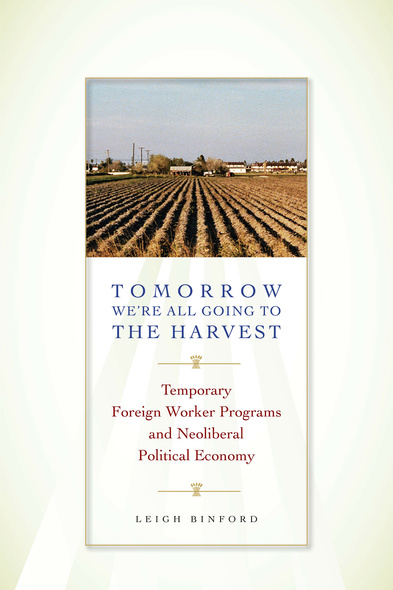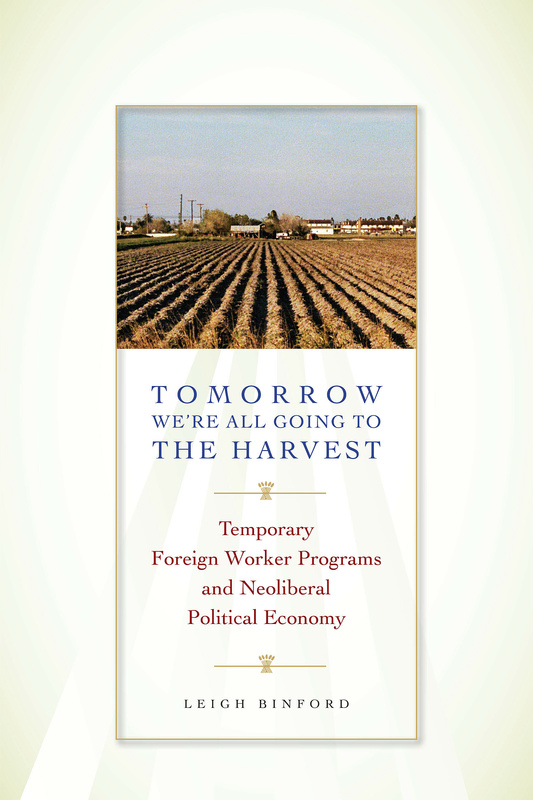Tomorrow We're All Going to the Harvest
Temporary Foreign Worker Programs and Neoliberal Political Economy
From its inception in 1966, the Canadian Seasonal Agricultural Worker Program (SAWP) has grown to employ approximately 20,000 workers annually, the majority from Mexico. The program has been hailed as a model that alleviates human rights concerns because, under contract, SAWP workers travel legally, receive health benefits, contribute to pensions, are represented by Canadian consular officials, and rate the program favorably. Tomorrow We’re All Going to the Harvest takes us behind the ideology and examines the daily lives of SAWP workers from Tlaxcala, Mexico (one of the leading sending states), observing the great personal and family price paid in order to experience a temporary rise in a standard of living. The book also observes the disparities of a gutted Mexican countryside versus the flourishing agriculture in Canada, where farm labor demand remains high.
Drawn from extensive surveys and nearly two hundred interviews, ethnographic work in Ontario (destination of over 77 percent of migrants in the author’s sample), and quantitative data, this is much more than a case study; it situates the Tlaxcala-Canada exchange within the broader issues of migration, economics, and cultural currents. Bringing to light the historical genesis of “complementary” labor markets and the contradictory positioning of Mexican government representatives, Leigh Binford also explores the language barriers and nonexistent worker networks in Canada, as well as the physical realities of the work itself, making this book a complete portrait of a provocative segment of migrant labor.
Binford has written an impressive and compelling book on the Canadian SAWP. The critical examination of this highly regarded program is timely as governments and industries argue for programs of their own without consideration of the human costs involved. For anthropologists entering into the fray of globalization and the consequences of neoliberal policies, this book makes a welcome contribution.
There is no study of these programs that even comes close to Binford’s book in terms of the amazing level of research. . . . It is well written, compelling and richly told, and above all it is really model scholarship. . . . This is not simply the best book on temporary foreign worker programs, but it speaks to larger issues of immigration, agriculture, and neoliberalism.
Fresh information. . . . A clear and highly readable argument [that] does a good job of covering virtually all the issues surrounding guest worker programs. Readers of this work will be impressed not only with this breadth but with the human detail Binford dons on each of these issues, giving them flesh and blood.
Leigh Binford is Chair of the Sociology, Anthropology, and Social Work Department of the College of Staten Island, CUNY. He is the author of The El Mozote Massacre: Anthropology and Human Rights, coedited Landscapes of Struggle: Politics, Community, and the Nation-State in Twentieth-Century El Salvador and Zapotec Struggles, and coauthored Obliging Need: Rural Petty Industry in Mexican Capitalism.
- List of Maps, Figures, and Tables
- List of Acronyms
- Acknowledgments
- Introduction: Contract Labor Migration in Theory and Practice
- Chapter 1: Agricultural Crisis, Migration, and Contract Labor: Tlaxcala, Mexico, and Ontario, Canada
- Chapter 2: The Dual Process of Constructing Mexican Contract Workers
- Chapter 3: “Tomorrow We’re All Going to the Harvest”: Case Studies of Contract Labor Migration
- Chapter 4: Interrogating Racialized Global Labor Supply: Caribbean and Mexican Workers in Canada’s SAWP (by Kerry Preibisch and Leigh Binford)
- Chapter 5: The Seasonal Agricultural Worker Program and Mexican Development
- Chapter 6: The Political Economy of Contract Labor in Neoliberal North America: Cheap Labor and Organized Labor
- Chapter 7: Globalization and Temporary Migrants: Post-National Citizens, Realpolitik, and Disposable Labor Power
- Appendix: The SAWP: Saving the Family Farm or Feeding Corporate Enterprise?
- Notes
- References
- Index






